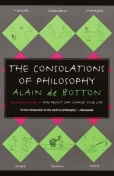BKMT READING GUIDES
The Consolations of Philosophy
by Alain De Botton
Paperback : 272 pages
0 club reading this now
1 member has read this book
Solace for the broken heart can be found in the words of Schopenhauer. ...
Introduction
From the internationally heralded author of How Proust Can Change Your Life comes this remarkable new book that presents the wisdom of some of the greatest thinkers of the ages as advice for our day to day struggles.
Solace for the broken heart can be found in the words of Schopenhauer. The ancient Greek Epicurus has the wisest, and most affordable, solution to cash flow problems. A remedy for impotence lies in Montaigne. Seneca offers advice upon losing a job. And Nietzsche has shrewd counsel for everything from loneliness to illness. The Consolations of Philosophy is a book as accessibly erudite as it is useful and entertaining.
Editorial Review
"It is common," Alain de Botton writes in The Consolations of Philosophy, "to assume that we are dealing with a highly intelligent book when we cease to understand it. Profound ideas cannot, after all, be explained in the language of children." While his easygoing exploration of philosophers from Socrates to Nietzsche isn't exactly written for the Blue's Clues set, few readers will cease to understand it. Furthermore, it's a joy to read. De Botton's 1997 How Proust Can Change Your Life forged a new kind of lit crit: an exploration of Remembrance of Things Past, delivered in the sweet-gummed envelope of an advice book. He returns to the self-help format here, this time plundering the great thinkers to puzzle out the way we ought to live.What was stunning about the Proust book was de Botton's brazen annexing of a hallowed novelist to address lite emotional problems. That format is less arresting when applied to the philosophers, since which earnest philosophy major has not, from time to time, tried to apply the alpine heights of thought to his own humble worries? Usually, sophomoric attempts to turn to, say, Kant for advice on love tend to be unmitigated disasters. In de Botton's case, however, he is able to find consolation for a broken heart in Schopenhauer, consolation for inadequacy in Montaigne. Epicurus, usually associated with a love of luxury, is a solace for those of us without much money--and de Botton learns from him that "objects mimic in a material dimension what we require in a psychological one. We need to rearrange our minds but are lured towards new shelves. We buy a cashmere cardigan as a substitute for the counsel of friends."
Lest the reader become burdened by all this philosophizing, the book is peppered with illustrations--the section on Nietzsche of course includes a DC Comics drawing of Superman. And it's further leavened by the author's personal anecdotes and winning confessional tone. Early on, for instance, he admits his own gnawing need for popularity: "A desire to please led me to laugh at modest jokes like a parent on the opening night of a school play." Before he became a medicine man for the soul, de Botton was a first-rate novelist, and it shows in his writing. --Claire Dederer
Discussion Questions
No discussion questions at this time.Book Club Recommendations
Recommended to book clubs by 0 of 0 members.
Book Club HQ to over 90,000+ book clubs and ready to welcome yours.
Get free weekly updates on top club picks, book giveaways, author events and more








